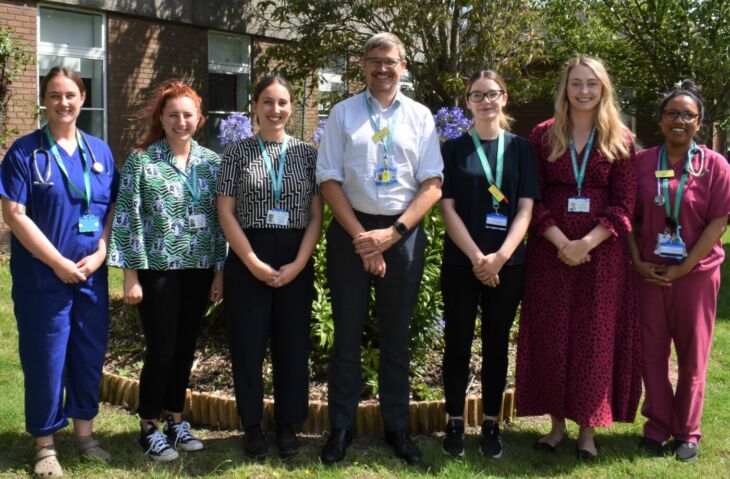Next week is Physician Associates Week, which recognises the PA profession and its contributions to the nation’s health. It is an opportunity to raise awareness and visibility of the profession.

Dr Simon Merritt, Chief Medical Officer, and our six physician associates
Physician Associates aren’t one of the better-known roles within the NHS so we spoke to Zoe Neale, Lead Physician Associate, who has been part of the Acute Frailty Team at Conquest Hospital since 2020, to find out more.
“A Physician Associate is a generalist healthcare specialist trained to a medical model,” says Zoe. “We work alongside doctors and nurses to provide medical care as integral part of a multidisciplinary team, under the supervision of a consultant. To become a PA I had to undertake a two-year postgraduate degree, which is a spilt between theory and clinical practice. PAs then sit national exams before being able to apply for a role. We are quite fortunate as PAs can work in both primary and secondary care and can move between specialities as we progress in our careers.
“Not many people know exactly what PAs are,” she continues. “We are there to support doctors and spread the workload. We take medical histories from patients, carry out physical examinations, formulate differential diagnoses and management plans, perform diagnostic and therapeutic procedures, and order and interpret investigations. PAs cannot prescribe and we always work under a dedicated, supervising consultant.”
There are six PAs working at ESHT: two in acute frailty, two in oncology, one in acute medicine and one in stroke medicine.
“A typical day for me in acute frailty would be an 8am start, where I catch up with the night team and nurses about anything that happened with the frailty patients that stayed in the acute assessment unit overnight, or new patients with frailty that have been admitted,” explains Zoe. “I then prepare my list of patients to see and go to handover. From 9am I begin reviewing patients, all of whom are aged 75 and over, with Rockwood score of five and above. The Rockwood scale is a measurement between one and nine of how frail an older person is. I see more complex patients with a consultant geriatrician.
“Outside of clinical reviews, jobs often include complex family/carer discussions, end of life care discussions, explaining medication reviews, referring to other specialities, clinical skills, offering advice to on call doctors, clerking new patients… You never know what you are going to walk into each morning, which is why I find it so interesting.
“I like being a constant in the acute assessment unit. I feel it is important in such a busy and high turnover unit. I feel it gives me the chance to help new colleagues to settle in, but also allows me lots of opportunities to teach students. I quite like being known as ‘part of the furniture’!”
Alicia Hague, Physician Associate for Oncology, agrees.
“I like being a Physician Associate because we can really integrate into the team and support our colleagues, while developing specialist skills within our chosen areas, and providing continuity of care to patients.”
Manchary Kalamohan, Physician Associate for Acute Medicine, believes that being able to provide ‘continuity in care’ is one of the best parts of the role. She says:
“I like working in acute medicine because there’s always a variety of illnesses to treat and patients to meet. It’s great being a static member of the medical team and being able to provide support to new doctors through their acute medicine rotations.”
To learn more about the Physician Associate role please email Zoe or visit the Healthcare Careers website.
